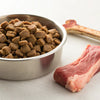Will It Hurt a Cat to Eat Dry Dog Food? Understanding the Risks and Nutritional Needs
- Houndsy
Table of Contents
- Introduction
- Can Cats Eat Dog Food? The Short Answer
- Nutritional Needs: Cats vs. Dogs
- What Happens If Cats Eat Dog Food?
- What To Do If Your Cat Eats Dog Food
- The Bottom Line: Feeding Your Cat Right
Introduction
Have you ever caught your cat sneaking food from your dog’s bowl and wondered, "Will it hurt a cat to eat dry dog food?" It’s a common scenario in multi-pet households, and many cat owners find themselves asking this very question. While it might seem harmless for a kitty to snag a few kibbles, the reality is more complex.
As responsible pet owners, we need to understand the nutritional needs of our feline companions, especially when it comes to their diets. Cats are obligate carnivores, meaning they rely on a diet rich in meat and animal-based proteins to thrive. On the other hand, dog food is formulated for omnivores and lacks many essential nutrients that cats require.
In this blog post, we will explore the implications of cats eating dog food, the nutritional differences between cat and dog food, and what to do if your cat eats dog food. By the end, you will have a clearer understanding of how to ensure your furry friends get the right nutrition and avoid any potential pitfalls.
Let’s dive into the fascinating world of pet nutrition, and reflect on your own pet’s feeding habits as we go along!
Can Cats Eat Dog Food? The Short Answer
To address the burning question: yes, a cat can eat dog food without immediate toxicity. However, this is not a recommendation or a sustainable feeding solution. While the occasional nibble might not cause harm, a diet primarily consisting of dog food can lead to serious health issues for your cat over time.
The Non-Toxic Nature of Dog Food
Dog food is generally considered safe for cats in small amounts. It does not contain ingredients that are toxic to cats, meaning a few bites here and there won’t likely lead to acute problems. However, the real concern lies in the long-term nutritional inadequacy that arises when cats consume dog food instead of their specially formulated diet.
Nutritional Needs: Cats vs. Dogs
Understanding the fundamental differences in nutritional needs between cats and dogs is crucial. Let’s break this down into key components:
Obligatory Carnivores vs. Omnivores
Cats are obligate carnivores, which means they must consume animal-based proteins to meet their dietary needs. In contrast, dogs are omnivores and can derive nutrition from both animal and plant sources. This difference is why dog food is not suitable for cats in the long run.
Essential Nutrients for Cats
Cats require specific nutrients that are either not present or are present in insufficient quantities in dog food:
- Taurine: An essential amino acid that cats cannot synthesize. A deficiency can lead to serious health issues like heart disease and vision problems.
- Arachidonic Acid: A fatty acid that cats cannot produce. It is critical for maintaining skin health, reproductive health, and overall well-being.
- Vitamin A: Unlike dogs, cats cannot convert beta-carotene from plants into vitamin A. They need pre-formed vitamin A, typically found in animal tissues.
- Niacin: Cats need higher levels of niacin than what is typically found in dog food.
Protein Content
Most dog foods have a protein content ranging from 18% to 26%, while cats require a protein intake of at least 30% to maintain their health. Some premium cat foods may even contain up to 50% protein.
Taste Preferences
Interestingly, cats perceive taste differently than dogs. With only about 470 taste buds compared to a dog’s 1700, cats do not have the same inclination to enjoy the flavor of dog food. They are more attracted to meat-based flavors, which is why they may occasionally find dog food unappetizing.
What Happens If Cats Eat Dog Food?
While a few pieces of dog food may not pose an immediate threat, regular consumption can lead to several health issues.
Short-Term Effects
If your cat has snuck some dog food, keep an eye out for potential short-term effects such as:
- Vomiting
- Diarrhea
- Constipation
- Abdominal discomfort
These symptoms can arise because the nutritional composition of dog food is not suited for a cat's digestive system.
Long-Term Consequences
Feeding a cat dog food over an extended period can lead to significant long-term health issues, including:
- Malnutrition: Without the necessary nutrients, cats may suffer from protein malnutrition, leading to muscle wasting and weakness.
- Heart Disease: A deficiency in taurine can result in dilated cardiomyopathy, a serious condition affecting the heart.
- Eye Problems: Insufficient vitamin A can lead to vision issues, including night blindness.
- Skin and Coat Problems: Lack of arachidonic acid can result in skin irritations and poor coat quality.
What To Do If Your Cat Eats Dog Food
If you catch your cat eating dog food, there’s no need to panic. Here are some steps to follow:
Monitor Their Health
Keep a close eye on your cat for any signs of distress or illness. If they show symptoms like vomiting or diarrhea, contact your veterinarian for advice.
Ensure Proper Nutrition
Make sure to provide your cat with a balanced diet formulated for felines. High-quality cat food will ensure they receive all the essential nutrients they need to thrive.
Prevent Future Incidents
To avoid further temptations, consider the following strategies:
- Separate Feeding Areas: Feed your dog and cat in different rooms to reduce the chance of them stealing each other’s food.
- Schedule Feeding Times: Instead of free feeding, establish regular meal times to control their food intake.
- Elevated Dog Bowls: If your dog is much larger than your cat, consider using elevated bowls for your dog to make it harder for your cat to reach.
The Bottom Line: Feeding Your Cat Right
While it might seem harmless for your cat to snack on dog food occasionally, it’s essential to prioritize their unique nutritional needs. For your cat’s long-term health, stick to high-quality cat food that meets their specific dietary requirements.
If you find that your cat is consistently trying to eat dog food, it may be worth examining their own food and ensuring it is appealing enough for them.
Reflecting on Our Feeding Practices
As pet owners, it’s vital to remain attentive to our pets’ eating habits. Consider how you manage feeding time in your home. Are you providing your cat with the nutrition they need? How can you make their meals as enjoyable as possible?
At Houndsy, we believe that creating a beautiful and functional feeding experience is essential for both pets and their owners. Our flagship product, the Houndsy Kibble Dispenser, is designed not only to streamline and enhance the feeding ritual but also to ensure that your pets receive the right portions every time.
FAQ
Can I give my cat dog food in an emergency?
Yes, dog food can be given to a cat in an emergency as a temporary measure, but it should not replace their regular diet.
How often can a cat safely eat dog food?
Occasional nibbles of dog food are generally safe, but regular consumption can lead to nutritional deficiencies.
What should I do if my cat is showing signs of illness after eating dog food?
If your cat exhibits symptoms such as vomiting, diarrhea, or lethargy after eating dog food, contact your veterinarian immediately.
How can I prevent my cat from eating dog food?
Implement feeding routines that separate your pets during meal times or use elevated feeding bowls for your dog to deter your cat from accessing their food.
Is there any dog food that is safe for cats?
While some high-protein dog foods may contain ingredients that are not harmful to cats, they still do not meet all of the nutritional needs of cats. It's best to stick to food formulated specifically for felines.
In conclusion, while a cat can eat dog food without immediate harm, it should not be a part of their regular diet. A proper feeding routine and awareness of your pets' nutritional needs will help ensure they remain healthy and happy.












